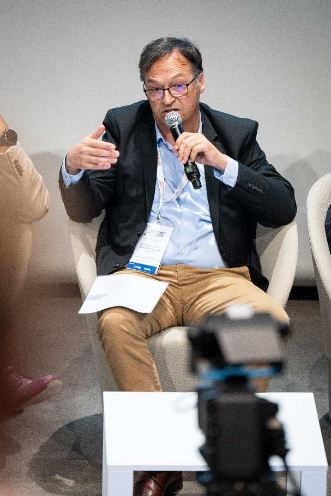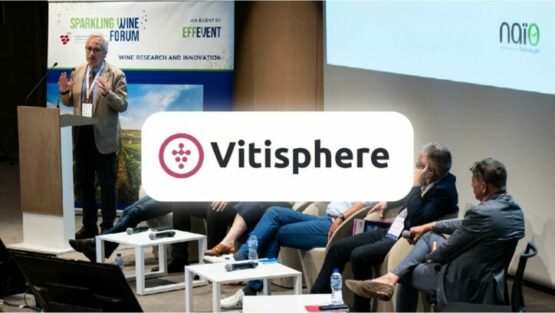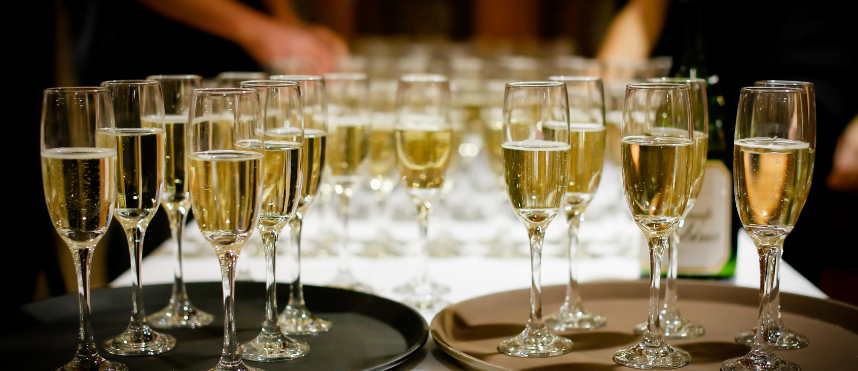The first Sparkling Wine Forum, 2023 edition, was a success
The organizers EFFEVENT and their Italian partner VINIDEA take stock of the first Sparkling Wine Forum (an event under the patronage of the OIV – International Organisation of Vine and Wine) held at the Village by CA in Reims-Bezannes on the 20th of June 2023. 34 international researchers and sparkling wine professionals gathered to answer the question, “How can sparkling wines cope with climate change?
A highly anticipated new event in Champagne
The auditorium was sold out from the beginning of the morning before the introductory speeches. Of the 250 professionals from 8 different nationalities, 48 percent of respondents called the event “interesting” and 52 percent “very interesting.” The innovative concept of the Sparkling Wine Forum, which aims to bring together international sparkling wine research and industry professionals, was praised by both the audience and the speakers.
To encourage the creation of collective solutions that address a global challenge by mobilizing experts from other sparkling wine regions
EFFEVENT is fulfilling its mission to make Champagne the global epicenter of innovation for sparkling wines. At the Sparkling Wine Forum, the 34 experts from 10 sparkling wine appellations talked about upstream and downstream aspects of the industry, from plant material and variety innovation to consumer expectations, viticultural robotics and various winemaking solutions.
Marc Brévot, director of Moët Hennessy’s Robert-Jean De Voguë Research Center, commented, “I hope this event will be a landmark and we are convinced that tomorrow we will be able to make real progress together, sharing knowledge and collectively generating solutions. It is interesting to hear testimonies from other countries and other wine regions, so we can compare and ask the same questions together.” “Some companies also explain their specific technical cases and the services they can offer professionals, which I find interesting,” says vigneron champenois Benoit Tarlant, who came to learn more at the Sparkling Wine Forum.
Rooted in Champagne, with editionsin other territories
As a catalyst for international sparkling wine research and innovation, the Sparkling Wine Forum will be held in alternate years in other sparkling wine regions, French or foreign. With this alternation, EFFEVENT aims to build bridges between Champagne and other sparkling wine appellations so that major issues in the sector can be addressed together. In 2025, EFFEVENT is planning an expanded edition of the Sparkling Wine Forum in Reims. Meanwhile, recordings of the conferences of the first edition will be available in the fall of 2023.
A glimpse of some of the presentations
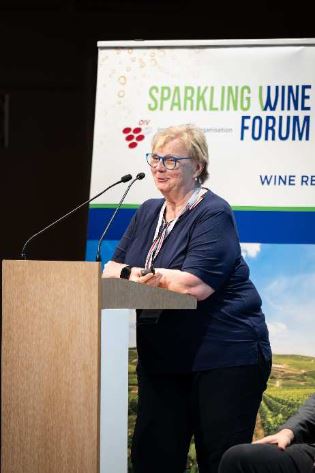
One of the speakers was Monika Christmann, director of the Institute of Oenology at the University of Geisenheim in Germany, who spoke about the preservation and typicality of sparkling wines in times of changing climate: “It is extremely important to have a collective exchange because we all share the same challenges, but there can be different solutions and ideas. So I think we can help each other to face the future and continue to produce the best wines in the world.”
Davide Bianchi, a viticulture researcher at the University of Milan, presented new drought-resistant rootstocks with a case study applied to Chardonnay vineyards in Franciacorta, Italy.
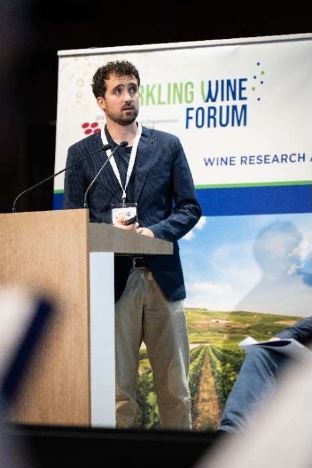
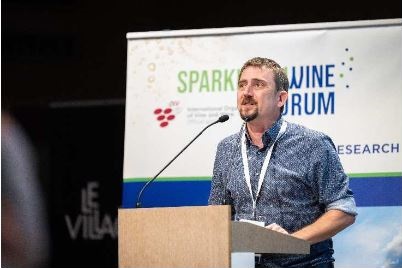
Benjamin Bois, a researcher in viticulture and climatology at the Institut de la Vigne et du Vin at the University of Dijon, has focused his research on climate change and viticulture in Burgundy, on the consequences and adaptations to be made.
Joël Rochard, an international consultant in oenology and sustainable viticulture for sparkling wines, studied applied sustainability to sparkling wines.
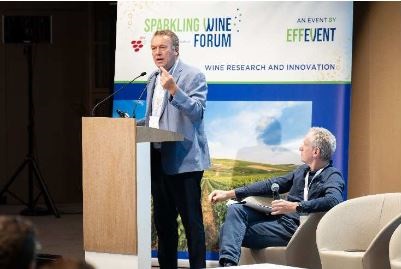
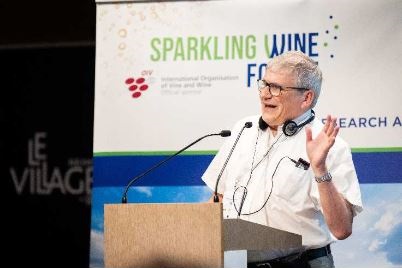
Stefano Poni, professor of viticulture at the University of Piacenza, presented alternative methods of vine cultivation to combat the effects of global warming.
Pascal Poupault, an agronomic engineer at the Institut Français de la Vigne et du Vin (IFV), analyzed new resistant grape varieties, such as Voltis, used in sparkling wines to adapt to climate change.
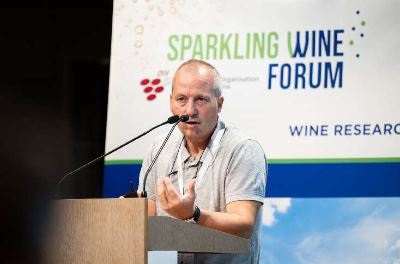
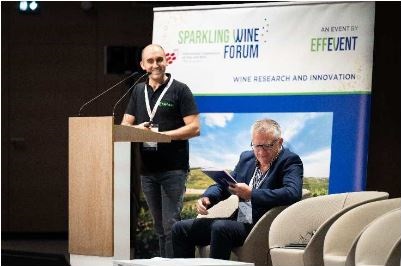
Robotics and artificial intelligence in the wine sector were also discussed, with the presentation of NAÏO’s autonomous electric tractor and HIPHEN’s Phenostation, which sorts grapes and detects diseases at harvest time.
OENOLOGY
The day also provided a number of solutions for preserving acidity, an important indicator for sparkling wines that is being compromised by global warming.
Fernando Zamora, a professor from the University of Tarragona in Spain, presented results on the effects of using cation exchange to reduce pH in the composition and quality of sparkling wine.
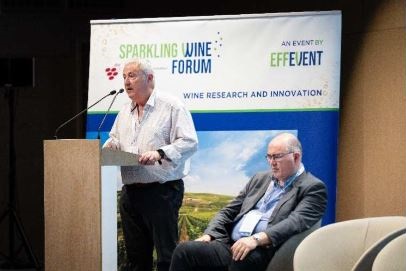
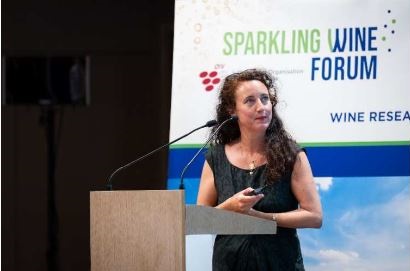
Echoing this presentation, Joana Coulon, R&D and Microbiology Manager at BioLaffort, studied acidity management by exploiting the diversity of living organisms, while the Institut Œnologique de Champagne presented new solutions to ensure the tartaric and colloidal stability of white sparkling wines.
With Virginie Thollin, consultant winemaker, Italian company PE.DI presented a new generation of crown caps designed to preserve the freshness of sparkling wine in a warm climate.
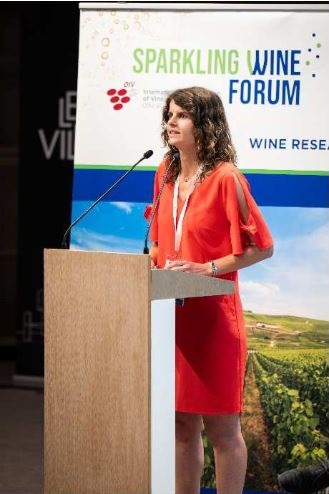
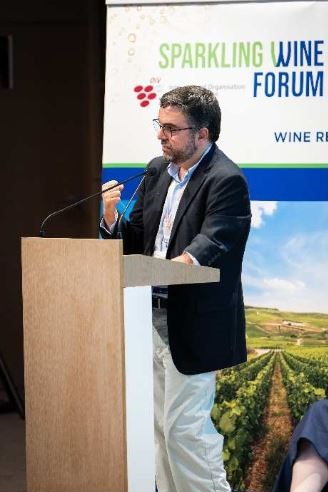
Amorim has unveiled a new cork, a 100% recyclable, natural eco-friendly material with characteristics that significantly reduce the carbon footprint. Fabrice Wehrung of Sofralab presented new riddling processes and technologies to adapt to the changes induced in the bottle by climate change.
The speaker was Francisco Campos, research and development project manager for champagne corks.
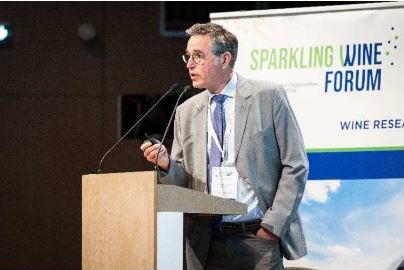
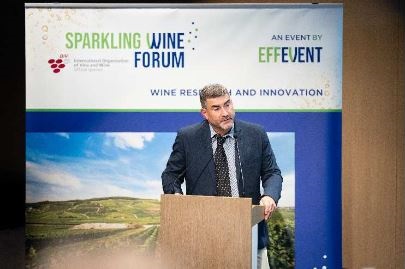
Finally, Italian company Clayver presented new stoneware wine vessels designed to adapt the aging of sparkling base wines to climate change.
MARKETING AND CONSUMER EXPECTATIONS
Issues downstream of production, such as marketing, were also addressed with Nathalie Spielmann, director of the Department of Wine and Gastronomy at Neoma Business School in Reims, who spoke about the new consumer expectations regarding climate change.
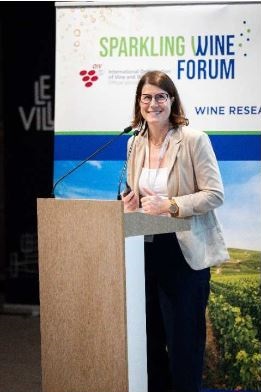
Two round tables to better address the higher-priority expectations of the supply chain regarding sparkling wine research and climate change:
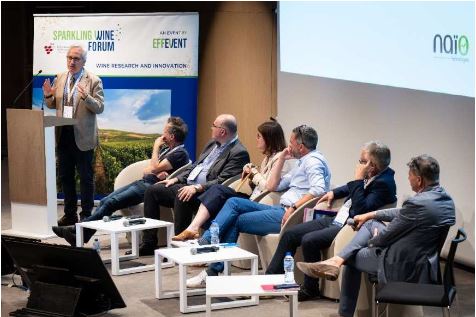
The day ended with a panel discussion chaired by Luigi MOIO, president of the International Organization of Vine and Wine (OIV), according to whom “in the future we will have to do our best to continue to produce great wines in our historic terroirs.” Alongside the members of the scientific committee, the representatives from other foreign sparkling wine regions spoke about the effects of changing climate on the vineyards of Cava, Prosecco and Franciacorta.
Wilfrid Devaugermé, president of the Champagne oenologists, shed light on the expectations of Champagne producers and the effects of climate change on the region’s vineyards. Everyone was able to share the solutions put in place locally to adapt the production of their sparkling wines in response to climate change.
